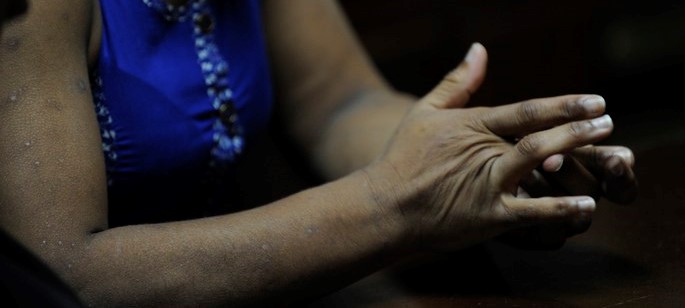
Publicado el 1 de agosto de 2016 | Social Justice News Nexus
Por Elyse Samuels
Diana Aponte, or “Candy,” spent years living on the streets around San Juan, Puerto Rico, addicted to drugs and doing whatever she could to survive. After ending up in a hospital intensive care unit, Aponte realized she needed help and found her way to Compromiso de Vida, a women’s drug treatment center run by the organization Iniciativa Comunitaria. A year later, Aponte was clean and doing outreach to help other women fight addictions.
But as Puerto Rico suffers crippling debt and drug crises, it is likely getting harder and harder for people addicted to drugs to get treatment and help. For women, the situation is even worse.

Compromiso de Vida 1 director Diana Camacho. Photo by Bill Healey.
Diana Camacho is the director of Compromiso de Vida Uno, which offers 21-day detoxification stays, counseling and other services. Camacho said not only are drug treatment centers struggling, but women particularly lack options for treatment.
She estimates that in all of Puerto Rico, there are only five drug treatment centers for women, while there are 30 to 35 centers for men.
Camacho and other experts in the field in Puerto Rico maintain drug addicted women and homeless women specifically face different hardships than men in similar situations. These challenges include abuse, trauma, relying on men for drugs, sex-work, lack of safety in the streets and social stigma.
Maria Hidalgo, a lawyer currently studying to be a social worker, worked at Compromiso de Vida Uno for two years as part of her training practicum.
“[The women] don’t only have drug problems,” Hidalgo said. “They were in jail, probably like 30 percent of them, or they’ve been abused in childhood or experienced domestic violence. So probably the drug addiction is the result of other factors, situations that they had.”

Beds at the Compromiso de Vida 1 treatment center. Photo by Bill Healey.
Camacho agrees. When asked what situations in particular women face as homeless drug addicts, she put her hand to her heart in despair and said, “You put a knife in my heart, you see. The women have so many problems. Trauma or child abuse, not just sex abuse, child abuse. And we have several women who do not read or write.”
Rafael Torruella is executive director of the needle-exchange program Intercambios Puerto Rico. He said there’s often a larger stigma associated with women who do drugs, because in Puerto Rico women are traditionally seen as mothers or caretakers.
“Women are particularly criminalized,” Torruella said. “When we talk about the war on drugs, here in Puerto Rico, just like in many places there’s a split of gender. Men are expected to be out on the street and women in the home.”
Torruella explained that because of this imbalance, women often rely on men to acquire drugs. This can pose dangerous dynamics of dependency and potential harm.
“Women are more at risk out there,” Torruella said. “With drug use, many times they’re not taught how to inject correctly…and I’m pretty sure it’s a lot harder for women to be homeless. It’s fears as real as being threatened, being raped, or being tagged as a bad mother.”
This fear and lack of independence can lead to women getting involved in sex work, only adding to the social stigma they may already face.
“Si [yes], the majority of them, at least once in their lifetime have been sex-workers,” Hidalgo said. “But they don’t think it’s that bad you know. They don’t, its not that they don’t know, but they don’t think it’s bad. They just probably justify why they are doing it because they know that they need money and they know that is the easiest and fastest way to get it.”
Torruella maintains that in general facilities should work harder to tailor treatment to individual situations.
“I think the world should keep in mind that everybody has specific needs in this society,” Torruella said. “Understanding that society is patriarchal and has done a disfavor to women. We should focus drug treatment to women, just like we should focus drug treatment to transgender people, and different populations that we know drug addiction affects differently.”
(Photo at top: A client at the Compromiso de Vida treatment center. Photo by Bill Healy)


